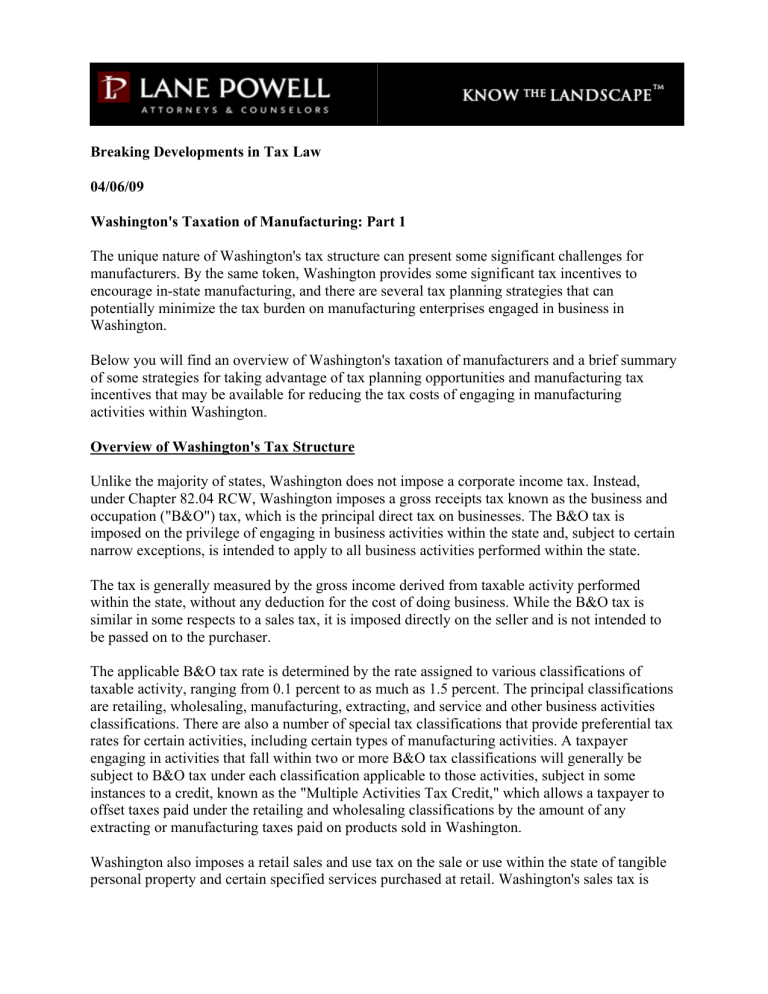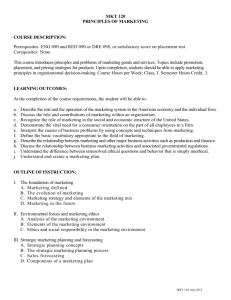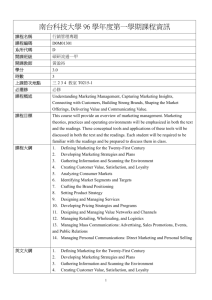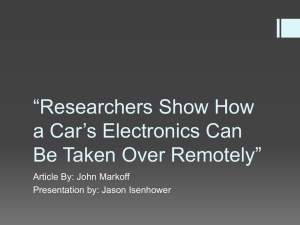The unique nature of Washington's tax structure can present some... manufacturers. By the same token, Washington provides some significant tax... Breaking Developments in Tax Law

Breaking Developments in Tax Law
04/06/09
Washington's Taxation of Manufacturing: Part 1
The unique nature of Washington's tax structure can present some significant challenges for manufacturers. By the same token, Washington provides some significant tax incentives to encourage in-state manufacturing, and there are several tax planning strategies that can potentially minimize the tax burden on manufacturing enterprises engaged in business in
Washington.
Below you will find an overview of Washington's taxation of manufacturers and a brief summary of some strategies for taking advantage of tax planning opportunities and manufacturing tax incentives that may be available for reducing the tax costs of engaging in manufacturing activities within Washington.
Overview of Washington's Tax Structure
Unlike the majority of states, Washington does not impose a corporate income tax. Instead, under Chapter 82.04 RCW, Washington imposes a gross receipts tax known as the business and occupation ("B&O") tax, which is the principal direct tax on businesses. The B&O tax is imposed on the privilege of engaging in business activities within the state and, subject to certain narrow exceptions, is intended to apply to all business activities performed within the state.
The tax is generally measured by the gross income derived from taxable activity performed within the state, without any deduction for the cost of doing business. While the B&O tax is similar in some respects to a sales tax, it is imposed directly on the seller and is not intended to be passed on to the purchaser.
The applicable B&O tax rate is determined by the rate assigned to various classifications of taxable activity, ranging from 0.1 percent to as much as 1.5 percent. The principal classifications are retailing, wholesaling, manufacturing, extracting, and service and other business activities classifications. There are also a number of special tax classifications that provide preferential tax rates for certain activities, including certain types of manufacturing activities. A taxpayer engaging in activities that fall within two or more B&O tax classifications will generally be subject to B&O tax under each classification applicable to those activities, subject in some instances to a credit, known as the "Multiple Activities Tax Credit," which allows a taxpayer to offset taxes paid under the retailing and wholesaling classifications by the amount of any extracting or manufacturing taxes paid on products sold in Washington.
Washington also imposes a retail sales and use tax on the sale or use within the state of tangible personal property and certain specified services purchased at retail. Washington's sales tax is
imposed on the purchaser and collected by the seller. The combined rate of the state and local components of the sales tax range from 7.5 to 9.5 percent.
Taxation of Manufacturing
Manufacturers are potentially subject to B&O tax under the retailing, wholesaling and manufacturing classifications. Additionally, manufacturers may be obligated to collect and remit sales tax on their retail sales of products within Washington. The application of these taxes varies significantly depending on the nature of activity, who performs it, the location where it occurs, and where the product is sold and delivered.
Definition of Manufacturing-Related Terms
Several key terms are critical to understanding the tax consequences of manufacturing in
Washington. The term "manufacturer" is defined as "every person who, either directly or by contracting with others for the necessary labor or mechanical services, manufactures for sale or for commercial or industrial use from his or her own materials or ingredients any articles, substances, or commodities."
"Manufacturing" includes "all activities of a commercial or industrial nature wherein labor or skill is applied, by hand or machinery, to materials so that as a result thereof a new, different or useful substance or article of tangible personal property is produced for sale or commercial or industrial use." In addition to the sort of industrial activities that fall within the ordinary meaning of the term, manufacturing encompasses many activities that involve only a minimal amount of processing or change to the end product, including the fabrication of custom-made items and the assembly of pre-manufactured components to achieve a special purpose.
There are several important exclusions from the definition of manufacturing. Manufacturing does not include growing, harvesting, producing or packing agricultural products. Furthermore, extracting minerals, timber or other natural resources does not constitute manufacturing provided that the activity does not involve any process that changes the characteristics or properties of the extracted materials.
Additionally, repairing and reconditioning of tangible personal property for third parties does not constitute manufacturing. To be considered "manufacturing," the activity must result in a "new, different, or useful article" of tangible personal property. If the activity merely extends the useful life of an existing article of tangible personal property or restores it to its original utility, the activity is considered a repair or refurbishing of that property, which is considered a retail sale and is subject to the retailing B&O tax and retail sales tax when performed for a third party.
Likewise, the activity of constructing buildings or otherwise making improvements to real property is excluded from the definition of manufacturing because it does not result in the production of an article of tangible personal property.
Taxes Applicable to Manufacturing and Selling
For purposes of Washington's B&O tax, manufacturing and selling are considered separate and
2
distinct taxable activities. The B&O tax is imposed on engaging within Washington in business as a manufacturer, regardless of whether the manufactured products are sold or delivered to a purchaser outside the state. The tax is imposed at 0.484 percent of the value of the manufactured products, which is generally equal to their selling price.
Additionally, the B&O tax is imposed on the gross proceeds derived from the business of making retail or wholesale sales of tangible personal property, at either 0.484 percent in the case of wholesaling or 0.471 percent in the case of retailing. To the extent that the sales are at retail ( i.e.
, sales to the ultimate consumer or user), Washington's retail sales tax applies as well and must be collected by the manufacturer if it has a substantial nexus with Washington (discussed below).
When a manufacturer engages in manufacturing activities within Washington and makes sales of products in Washington, the manufacturer is subject to both the manufacturing B&O tax and either the wholesaling or retailing B&O tax, as the case may be.
However, a business that is taxable on both manufacturing and selling activities is entitled to relief from paying B&O tax under both the manufacturing and wholesaling and retailing classifications by virtue of the application of the so-called "Multiple Activities Tax Credit," which provides a credit against the wholesaling or retailing taxes in an amount equal to any manufacturing taxes paid on products sold in Washington. By contrast, when a Washingtonbased manufacturer sells its products outside the state, it is entitled to an exemption from the wholesaling or retailing B&O taxes for interstate and foreign sales, but they will remain liable for the manufacturing B&O tax.
Out-of-state manufacturers are not subject to the manufacturing B&O tax to the extent that the manufacturing activity takes place outside Washington, but they may be liable for wholesaling or retailing B&O tax, as well as sales tax, if applicable, on sales of manufactured products delivered in Washington, provided that the manufacturer has a substantial nexus with Washington. Nexus is defined under the Washington Department of Revenue ("DOR") regulations as "activity carried on by the seller in Washington which is significantly associated with the seller's ability to establish or maintain a market for its products in Washington." Generally, this requires some sort of non-trivial physical presence within the state by the seller, its agents or other representatives.
Multiple Activities Tax Credit ("MATC")
The purpose of the MATC is to ensure that taxpayers engaged in multiple activities are not subjected to B&O tax under multiple classifications for the same gross receipts. A manufacturer who is taxable on both manufacturing and selling activities is entitled to offset its wholesaling or retailing B&O tax liability with a credit in the amount of any manufacturing taxes paid on products sold in Washington. It is important to note that the MATC applies not only to
Washington's manufacturing B&O tax, but also to any eligible gross receipts tax paid in another jurisdiction with respect to products manufactured outside Washington and sold in Washington.
Processors for Hire
As noted above, the statutory definition of a manufacturer includes persons who contract with a third party, known as a "processor for hire," for the performance of manufacturing services. A
"processor for hire" is defined as "any person who performs labor and mechanical services upon
3
property belonging to others so that as a result a new, different, or useful article of tangible personal property is produced for sale or commercial or industrial use." However, a non-resident of Washington who owns materials processed for it within the state by a processor for hire is not deemed to be a manufacturer in this state as a result of that processing.
By contrast, a person contracting to provide labor and mechanical services will be presumed to be a manufacturer instead of a processor for hire if the value of the materials or ingredients supplied by that person equals or exceeds 20 percent of the total value of all materials or ingredients used to produce the manufactured product.
Likewise, if the manufacturing facility and the ingredients used in the manufacturing process are owned by a person who contracts with a third party to perform the actual manufacturing activity, the owner of the facility and the ingredients used will be deemed as the manufacturer, and the person performing the manufacturing activity is a processor for hire.
Processors for hire are subject to the processing for hire B&O tax (which is imposed at the same rate as the manufacturing B&O tax), upon the total charge made for the provision of manufacturing services, including any charge for materials furnished by the processor. As with the manufacturing B&O tax, the processing for hire B&O tax applies whether the resulting product is delivered to the customer within or outside Washington.
Sales and Use Taxes
As noted above, sales and use tax applies to products manufactured and sold at retail.
Additionally, sales and use tax generally applies to purchases of tangible personal property used or consumed in the course of engaging in business. However, like most states, Washington provides an exemption for tangible personal property purchased for resale as such in the ordinary course of business.
Additionally, manufacturers are entitled to an exemption for materials or substances that are consumed in the manufacturing process and become an ingredient or component of the manufactured product, or are used primarily to create a chemical reaction directly through contact with an ingredient of a new article being produced for sale.
Additionally, as discussed below, manufacturers may be entitled to an exemption from sales and use tax that would otherwise be imposed on the purchase or use of qualifying machinery and equipment used directly in a manufacturing operation.
Tax Planning Opportunities
Under Washington's tax structure, transactions between parent, subsidiary and other affiliated legal entities are generally subject to B&O tax. While this frequently results in an increased tax burden for companies with significant intercompany transactions, under certain circumstances, bifurcating manufacturing and selling activities between affiliated entities can reduce the overall
B&O tax burden of a manufacturing enterprise. Additionally, Washington-based manufacturers may be eligible for various tax incentives that Washington makes available to encourage job creation and capital spending in the manufacturing sector.
4
Affiliated Processor for Hire
Manufacturers with facilities or related entities outside of Washington can reduce B&O taxes while still taking advantage of the various manufacturing-related exemptions and other tax incentives available in Washington (discussed below) by establishing a processor for hire arrangement.
Affiliated Sales Company
By utilizing a separate sales company to distribute manufactured products, a Washington manufacturer may be able to reduce its overall B&O tax burden with respect to sales of products delivered outside the state.
Exemptions, Credits and Incentives
Washington provides several significant tax incentives intended to encourage job creation and capital investment by manufacturers, such as:
•
•
•
•
Sales and Use Tax Exemption for Manufacturing Machinery and Equipment
Rural County/Community Empowerment Zone ("CEZ") Manufacturing Tax Incentives
High Technology Research and Development Tax Incentives
Preferential tax rates for selected manufacturing activities, such as processing certain types of agricultural products, producing bio-diesel and other alternative fuels, manufacturing commercial aircraft or component parts thereof, manufacturing lumber and other forest products, semiconductor manufacturing and aluminum smelting.
In addition to the above, Washington law provides a number of other special tax incentives targeting particular industries and business activities.
The foregoing is just a brief summary of Washington's taxation of manufacturers. The attorneys in Lane Powell's Tax Practice Group have a substantial amount of experience in advising manufacturing clients on strategies for structuring their business activities in a tax efficient manner. If you would like additional information regarding tax planning or more information on exemptions, credits and incentives, please contact Lane Powell's Tax Group.
For more information, please contact the Tax Law Practice Group at Lane Powell:
206.223.7000 Seattle
503.778.2100 Portland taxlaw@lanepowell.com
www.lanepowell.com
5
We provide the Tax Law Hotsheet as a service to our clients, colleagues and friends. It is intended to be a source of general information, not an opinion or legal advice on any specific situation, and does not create an attorney-client relationship with our readers. If you would like more information regarding whether we may assist you in any particular matter, please contact one of our lawyers, using care not to provide us any confidential information until we have notified you in writing that there are no conflicts of interest and that we have agreed to represent you on the specific matter that is the subject of your inquiry.
Copyright © 2009 Lane Powell PC www.lanepowell.com
Seattle - Portland - Anchorage - Olympia - Tacoma - London
6


